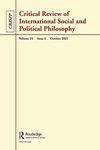Are citizens responsible for global wrongs?
IF 0.9
Q3 POLITICAL SCIENCE
Critical Review of International Social and Political Philosophy
Pub Date : 2022-10-25
DOI:10.1080/13698230.2022.2075149
引用次数: 0
Abstract
ABSTRACT This essay critically assesses Christine Hobden’s argument in Citizenship in a Globalised World that democratic citizenship is an important vehicle for the attainment of global justice. The first section examines Hobden’s claim that cosmopolitan consequentialism justifies citizenship in separate states. I argue that for this argument to succeed, it needs to elaborate a connection between relational equality for individuals and the self-determination of political groups. The second section scrutinizes Hobden’s account of the collective culpability of a democratic citizenry for their state’s wrongful actions. I argue that it is difficult to make sense of collective culpability: we are better off focusing on the personal culpability of individuals for contributing to collective wrongs.公民是否应对全球错误负责?
本文章由计算机程序翻译,如有差异,请以英文原文为准。
求助全文
约1分钟内获得全文
求助全文
来源期刊

Critical Review of International Social and Political Philosophy
POLITICAL SCIENCE-
CiteScore
1.60
自引率
0.00%
发文量
74
 求助内容:
求助内容: 应助结果提醒方式:
应助结果提醒方式:


